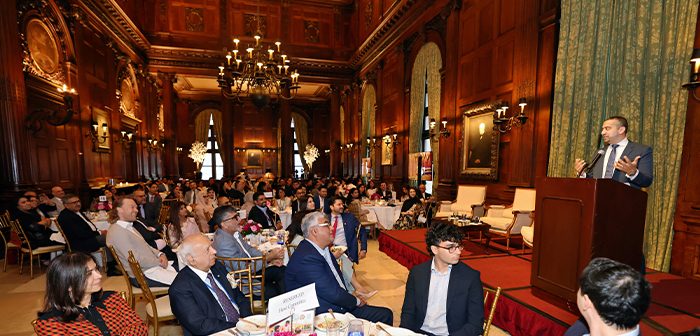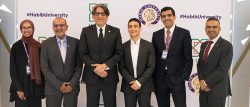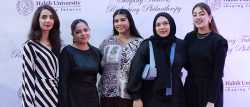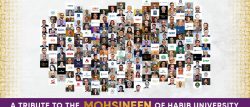Habib University, a pioneering liberal arts and sciences institution based in Karachi, held its inaugural community dinner in the United States on June 13, 2025, at the prestigious University Club of Manhattan. Titled “The Beginning Belongs to You,” the event brought together a distinguished gathering of business leaders, academics, philanthropists, and long-standing supporters to reflect on Pakistan’s escalating higher education crisis and to spotlight Habib University’s distinct, community-funded approach to solving it.
Established in 2014 with the vision to offer globally competitive, intellectually rigorous undergraduate education to students across Pakistan, particularly those historically excluded from access to such opportunities, Habib University stands today as a rare and bold experiment in academic innovation. In its short yet powerful history, the University has set itself apart not just by the quality of its programs, but by its unwavering commitment to justice, equity, and the transformative potential of learning. Through its community of generous supporters, it has consistently demonstrated that access to education must not be dictated by a student’s financial circumstances but instead driven by merit, aspiration, and intellectual curiosity.
The New York event marked a critical milestone in Habib University’s global engagement efforts. Organized to extend the University’s mission to the North American diaspora and philanthropic community, the evening was a testament to the power of collective resolve. The carefully curated gathering served to bridge geographical distances and reminded attendees that the mission of cultivating an enlightened, inclusive Pakistan is not limited by national borders, it is a shared responsibility.
Keynote speaker and celebrated British-American journalist Mehdi Hasan delivered a powerful address on the moral and social imperatives of supporting higher education. Citing the entrenched inequalities and underinvestment that characterize education systems across South Asia, Hasan urged the audience to act with urgency and clarity. “We have to open the doors of higher education to students who are excluded from college,” he said. “That is part of the reason why we are here tonight. Because we cannot afford simply to see university as some sort of luxury just for us.” Hasan commended Habib University’s efforts in establishing an independent, liberal arts institution in a context where support from states for such initiatives remains minimal. His message resonated deeply with the audience, many of whom have long supported education and equity in Pakistan through philanthropic and civic means.
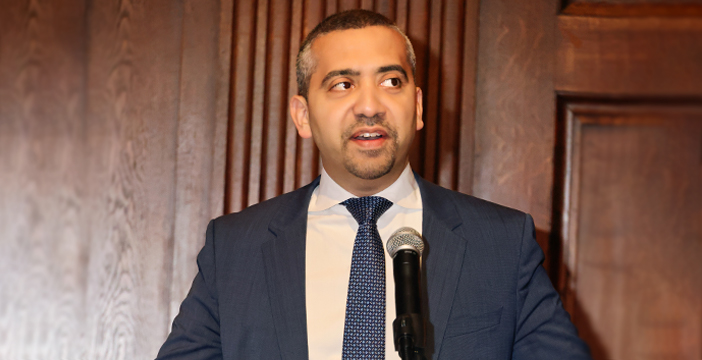
Mr. Mehdi Hasan, renowned journalist and author, delivers a gripping keynote on how institutions like Habib University can help mend fractured societies— urging the audience to view education as an act of rebuilding, resistance, and long-term reform.
At the heart of Habib University’s academic philosophy lies a deep belief in the relevance of the liberal arts and sciences for Pakistan’s contemporary needs. In a society facing overlapping crises from sectarian fragmentation and economic volatility to environmental degradation and intellectual stagnation, a narrow, technical education cannot suffice. The liberal arts offer something essential: the capacity to think critically across disciplines, to communicate ethically and effectively, to engage deeply with inherited traditions, and to envision new social futures. Habib University is the first institution in Pakistan to offer such an education with a serious, localized commitment. Its programs draw from global traditions of inquiry while responding to the unique historical, linguistic, and political contexts of the region. By doing so, it seeks to graduate not just professionals, but individuals prepared to lead with thoughtfulness, humility, and purpose.
President Wasif Rizvi offered a sobering yet hopeful analysis of Pakistan’s higher education landscape, highlighting the urgent need for systemic, long-term solutions. He described Habib University’s founding as a response to the intellectual and infrastructural erosion of Pakistani academia, particularly the absence of globally relevant curricula and sustainable access frameworks. “About 85% of Habib’s students are financially supported,” Rizvi shared, “and nearly half of them come from local examination boards.” In his remarks, he emphasized that Habib University was never meant to be an elite institution in the conventional sense. Instead, it was envisioned as a radical reimagining of what a university could be in Pakistan.
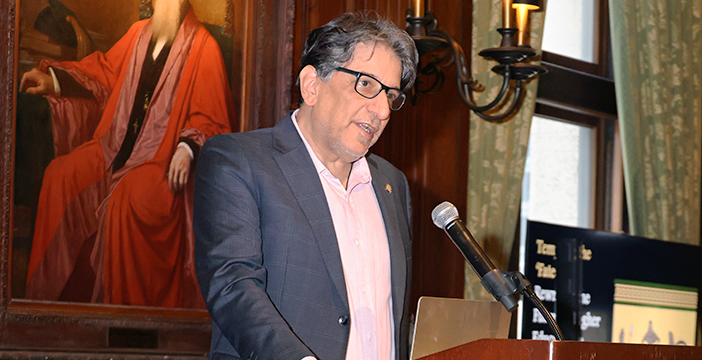
President Wasif A. Rizvi, addresses the urgent and growing crisis of access to higher education in Pakistan, emphasizing that excellence without access will only deepen societal divides.
One of the most heartfelt moments of the evening came from Narjis Zehra, a graduate of the Class of 2020, who addressed the audience with clarity and conviction. Reflecting on her academic journey, she shared, “I have nothing but deep gratitude for everything that Habib gave me.” Her presence on stage served as living proof of the University’s mission: to empower talented students with the tools, support, and vision to imagine and realize a future far beyond what circumstances alone would have allowed.
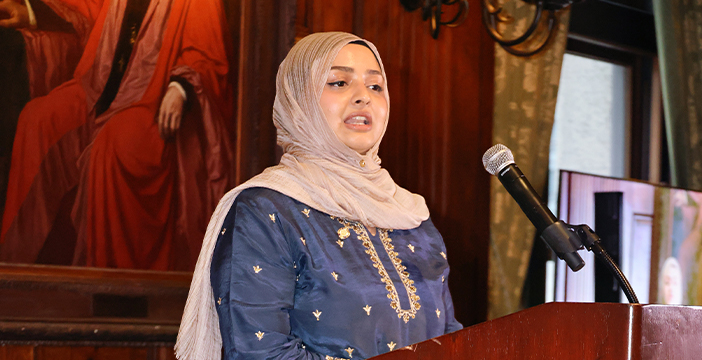
Ms. Narjis Zehra, Electrical Engineering Class of 2020 and Senior Consultant at Synpulse, shares her life-changing journey at Habib University, encouraging the New York community to invest in students like her who are shaping Pakistan’s future.
The event also featured a panel discussion moderated by Dr. Alexander Key, Associate Professor of Comparative Literature, Stanford University, and Member, Board of Governors, Habib University, who led a dialogue on the role of institutions in fractured societies. The panelists emphasized the urgent need to invest in platforms that promote dialogue, critical thinking, and inclusive leadership.
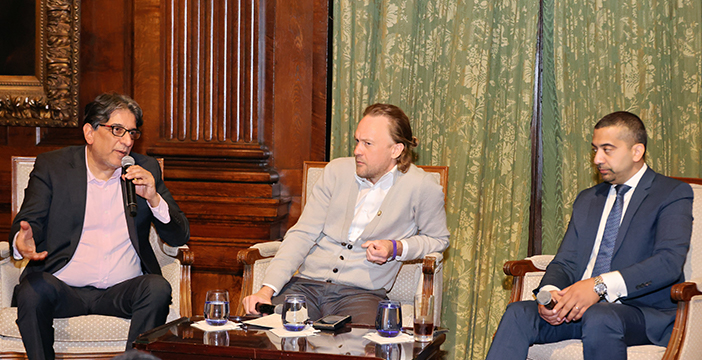
(L-R) President Wasif A. Rizvi, Dr. Alexander Key, and Mr. Mehdi Hasan in conversation during a panel titled “Shaping Futures” as they discuss why ensuring equitable access to quality higher education in Pakistan is more vital than ever.
Several members of the University’s extended community shared their reflections on the institution’s impact. “Habib is enabling young people to become future leaders, not just in engineering or the social sciences, but in morality,” noted Malik Saeed Sarwar, Board Member, American Pakistan Foundation. “This is a model that breaks the mold,” echoed Mehdi Hasan, “and it’s working because of the support of the community both at home and in the diaspora.” Others, such as Dirk Bergemann, Professor of Economics at Yale University, and Dr. Kishwar Rizvi, Professor in the History of Art and Architecture at Yale University, spoke about Habib University’s intellectual distinctiveness and the urgent need to continue supporting such models of education in the Global South.
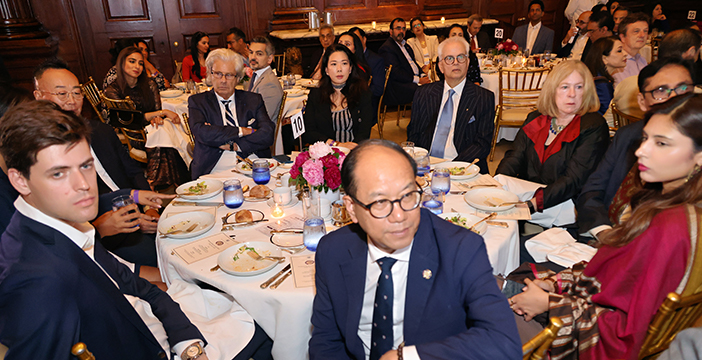
Guests listening intently as speakers lay out the challenges and hopes tied to Pakistan’s higher education landscape—reminding the audience that institutional building and its sustenance is key to equitable access and social cohesion.
The inaugural dinner in New York was not merely an occasion to celebrate past accomplishments, but a moment to catalyze future partnerships. The evening ended with a shared recognition that the future of Pakistan’s intellectual and civic life depends on institutions like Habib University, and on the continued support of those who believe in its vision.

